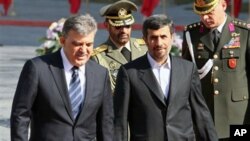The Turkish president is starting his three-day visit to Iran Monday, which is aimed at developing political and trade ties with its neighbor. The two countries have committed themselves to tripling bilateral trade. But the visit comes at a sensitive time, with Turkey's western allies pushing for the economic isolation of the country because of concerns over Iran's controversial nuclear energy program.
Turkish President Abdullah Gul is being accompanied by more than 100 businessmen during his meetings in Iran. Turkey and Iran earlier this month have committed themselves to tripling the current $10 billion in bilateral trade to $30 billion by 2015.
Burak Ozgergin, a Turkey foreign ministry official, said Turkey's engagement with Iran offers the best way forward. "The way to get the Iranians to cooperate, not to threaten them with sanctions, but offer cooperation to them. In other words the carrot not the stick. Because what we are afraid of, is that there is a natural opposition in Iran to cooperating with the West."
Gul, in an interview ahead of his visit, said Iran's nuclear issue should be solved through negotiations and Turkey will continue to facilitate this.
Turkey, a NATO member and a candidate for joining the EU, has been positioning itself as a mediator. Last year it helped broker an agreement with Iran. But the deal was dismissed by the international community, with one senior EU diplomat referring to it as a fiasco.
Last month, the latest round of talks between Iran and the international community collapsed, resulting in calls for further economic sanctions against Tehran.
Political scientist Cengiz Aktar said the timing of the Turkish president's visit to Iran is a sign of how out of step Turkey is with it western allies.
"I think overconfidence is a very, very bad adviser, especially in international relations," said Aktar. "Turkey is becoming a strong country. But Turkey does not mean anything by itself. Turkey, a bit like Germany and France, is a middle-sized power and we should not exaggerate its strength. I think the government should understand that the 21 century is not a the century of free riders, but the century of cooperation."
Despite close ties with the EU and the U.S., Turkey has said it will only enforce U.N. sanctions against Iran. Earlier this month, several Turkish companies were blacklisted by the U.S. for violating its Iranian sanctions. Despite the move, Turkish Prime Minister Recep Tayyip Erdogan said there will be no change in policy. "Everyone knows our stance on sanctions on Iran," said Erdogan.
Deepening economic ties with Iran are expected to focus primarily on energy. Iran is Turkey's second largest supplier of natural gas. Observers say Ankara is keen for Turkish companies to develop Iran's energy sector, especially as many international competitors have withdrawn due to tightening sanctions.
Ankara also sees Iran as playing a key role in helping to develop Turkey as a regional energy hub. Chief economist Emre Yigit of Turkish based Global Securities says this is in Europe's interest as well.
"The whole point of Nabucco pipeline, for example, is to diversify the source of European natural gas imports away from Russia and this will have to include the Iranians," said Yigit. "Turkey will play along with the European view. People can vote for sanctions and yet make their plans on the assumption in the long term these sanctions will no longer apply."
Is Turkey playing a strategic long-term game, acting in the interests of its neighbors, as well as its western allies, or is it becoming an increasingly maverick state? The Turkish president's visit to Iran likely will support both arguments. But if the controversy over Iran's nuclear program deepens, as expected, observers say the present diplomatic balancing act that Turkey is performing will become much harder to maneuver.

